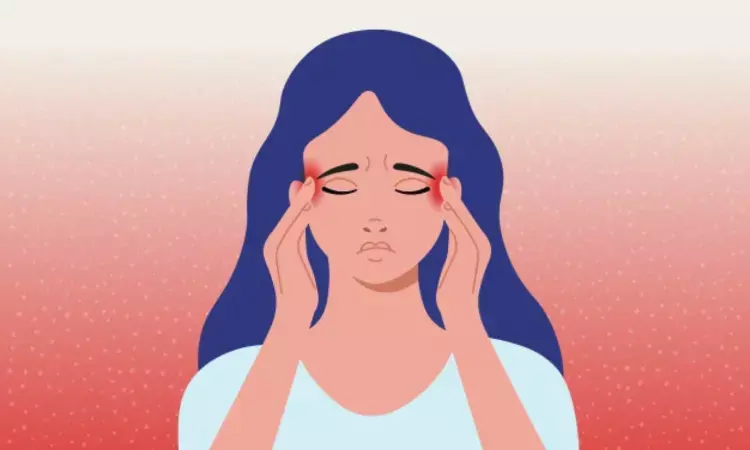- Home
- Medical news & Guidelines
- Anesthesiology
- Cardiology and CTVS
- Critical Care
- Dentistry
- Dermatology
- Diabetes and Endocrinology
- ENT
- Gastroenterology
- Medicine
- Nephrology
- Neurology
- Obstretics-Gynaecology
- Oncology
- Ophthalmology
- Orthopaedics
- Pediatrics-Neonatology
- Psychiatry
- Pulmonology
- Radiology
- Surgery
- Urology
- Laboratory Medicine
- Diet
- Nursing
- Paramedical
- Physiotherapy
- Health news
- Fact Check
- Bone Health Fact Check
- Brain Health Fact Check
- Cancer Related Fact Check
- Child Care Fact Check
- Dental and oral health fact check
- Diabetes and metabolic health fact check
- Diet and Nutrition Fact Check
- Eye and ENT Care Fact Check
- Fitness fact check
- Gut health fact check
- Heart health fact check
- Kidney health fact check
- Medical education fact check
- Men's health fact check
- Respiratory fact check
- Skin and hair care fact check
- Vaccine and Immunization fact check
- Women's health fact check
- AYUSH
- State News
- Andaman and Nicobar Islands
- Andhra Pradesh
- Arunachal Pradesh
- Assam
- Bihar
- Chandigarh
- Chattisgarh
- Dadra and Nagar Haveli
- Daman and Diu
- Delhi
- Goa
- Gujarat
- Haryana
- Himachal Pradesh
- Jammu & Kashmir
- Jharkhand
- Karnataka
- Kerala
- Ladakh
- Lakshadweep
- Madhya Pradesh
- Maharashtra
- Manipur
- Meghalaya
- Mizoram
- Nagaland
- Odisha
- Puducherry
- Punjab
- Rajasthan
- Sikkim
- Tamil Nadu
- Telangana
- Tripura
- Uttar Pradesh
- Uttrakhand
- West Bengal
- Medical Education
- Industry
OCTA parameters clinically useful biomarker for monitoring pediatric migraine

New research revealed that pediatric migraine that appears to be linked to reduced superficial entire and parafoveal vessel densities due to hypoperfusion and ischemia, can be easily followed up and managed by optical coherence tomography angiography. The study was published in the Journal of Neuro-ophthalmology.
Migraine is common neurological condition in the pediatric population affecting boys and girls equally in childhood. The prevalence of it increases over the course of Childhood and adolescence. Recognizing the condition is very important owing to its high prevalence and the associated disability. As it is well recognized that migraine increases the risk of retinal and optic nerve damage in pediatric population, researchers conducted a study to use optical coherence tomography angiography (OCTA) to assess the optic disc and retinal microvasculature in children with pediatric migraine (PM).
A cross sectional prospective study was carried out on forty-six eyes of 23 patients with PM without aura (PM group) and 46 eyes of 23 age- and sex-matched healthy subjects (control group). Ophthalmological evaluation included OCTA measurements along with Demographic features was taken. OCTA was performed with 6- × 6-mm sections for macula and 4.5- × 4.5-mm sections for optic nerve head in all eyes. In between group comparision and analysis of Foveal retinal thickness (FRT), peripapillary retinal nerve fiber layer (RNFL) thickness, vessel density in different sections of the retina, and optic disc was carried out. All measurements of the PM patients were taken in the attack-free period.
BDS, MDS
Dr.Niharika Harsha B (BDS,MDS) completed her BDS from Govt Dental College, Hyderabad and MDS from Dr.NTR University of health sciences(Now Kaloji Rao University). She has 4 years of private dental practice and worked for 2 years as Consultant Oral Radiologist at a Dental Imaging Centre in Hyderabad. She worked as Research Assistant and scientific writer in the development of Oral Anti cancer screening device with her seniors. She has a deep intriguing wish in writing highly engaging, captivating and informative medical content for a wider audience. She can be contacted at editorial@medicaldialogues.in.
Dr Kamal Kant Kohli-MBBS, DTCD- a chest specialist with more than 30 years of practice and a flair for writing clinical articles, Dr Kamal Kant Kohli joined Medical Dialogues as a Chief Editor of Medical News. Besides writing articles, as an editor, he proofreads and verifies all the medical content published on Medical Dialogues including those coming from journals, studies,medical conferences,guidelines etc. Email: drkohli@medicaldialogues.in. Contact no. 011-43720751


